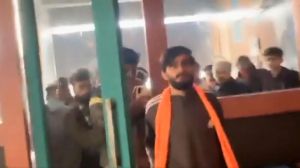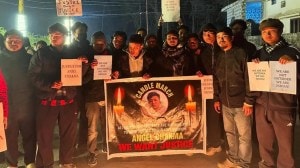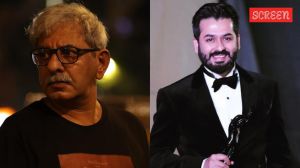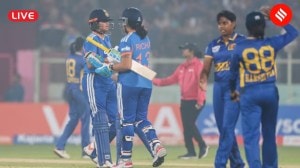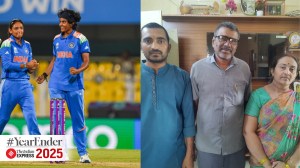Thoughts on the Republic
It has been fun writing for The Indian Express, often uninhibitedly, over the last 18 months. A friendly phone call on a Saturday morning...

It has been fun writing for The Indian Express, often uninhibitedly, over the last 18 months. A friendly phone call on a Saturday morning, the day when my column appears in print, revives my spirits. I end the day hoping that my intervention would convey some sense to somebody living far away from the metropolis, somebody open to reason and free inquiry and wedded to decent and civilised norms and values, somebody who isn8217;t busy desecrating churches, digging cricket pitches or killing the weaker sections of our society. This is, after all, the raison d8217;etre for producing a column every fortnight.
This week was different. I asked myself if it was at all worth writing and adding my voice to the legion of comments on the spurt of violence, including the murder of G.S. Staines and his two sons in Orissa, described by the President as 8220;a monumental aberration8221; from our traditions of tolerance and humanity.
Many of us are agitated and distressed by the crisis of governance, the inter-party feuds, thecivil strife in society taking an ugly turn in parts of Gujarat, Karnataka and Bihar, and the display of intolerance and religious fanaticism by some of our co-citizens. There is something in the air, regardless of what the urban elites may say, that makes me feel uneasy and restless. Still, I was not sufficiently motivated to write.
It was not clear whether I should comment on the confusing signals emanating from the recently concluded Congress Working Committee meeting or the vandalism of the Shiv Sainiks. Or, perhaps, the desecration of churches and the brutal killing of Staines and his children, the gruesome murder of 23 Dalits in Jehanabad district, the martyrdom of the Mahatma on January 30 which is all but forgotten nowadays? Or, should one coolly ignore such unpleasant happenings and comment, instead, on the pomp and pageantry of the Republic Day parade, the awesome display of sophisticated missiles? This is the appropriate occasion to invoke, as does Bal Thackeray, our civilisationalheritage.
This is the moment to celebrate, as the VHP and the Bajrang Dal activists tell you, our long-standing traditions of tolerance. The Constitution of the Republic 50 years ago symbolised our commitment to freedom, democracy and social justice. It was a momentous event, an occasion to remember, rejoice and celebrate. Watching the Republic Day Parade in 1955, the country8217;s first Prime Minister, had a sense of fulfilment 8220;in the air and of confidence in our future destiny8221;. Two years later, Nehru told the chief ministers: 8220;If we look about to various countries which have recently attained freedom 8230; India compares favourably with them, both in regard to our stability and the progress we have made in these last 10 years. The record is a creditable one, and this is increasingly recognised by other countries of the world.8221;
I wonder what the present Indian Prime Minister would have said or written to his friends and colleagues on January 26. Surely, he would not have repeated the claim made by one ofhis most distinguished predecessors nearly 40 years ago. If anything, he may have bemoaned the lack of political stability, the degradation in public life, the overall drift in our polity.
He may have even commented on his differences with his ministers, his coalition partners, and his mentors in the RSS. If he were sensitive he would have discussed the atrocities against women and Dalits, the harsh realities of life encountered by the vast majority of our people, and the ever-increasing gap between the rich and the poor.
He could have gone along with the diehards or the self-proclaimed defenders of India8217;s national/strategic interests on the nuclear issue, but he way have also echoed the views of his no less patriotic citizens who believe that the nuclear explosion at Pokharan has caused incalculable damage to our image in the comity of nations and that, in the long run, we may end up paying a heavy price for our impetuousness.
The Prime Minister would have had many important things to write of hischief ministers. Yet one assumes that he would have taken notice of, and expressed his uneasiness with, the growing militancy and stridency of some of his own comrades. Posterity would know his views on the happenings in Gujarat, western Karnataka and Orissa, though one hopes that these incidents, accurately and sensibly reported in the media, are not treated by him as sporadic and isolated or the result of an international conspiracy.
As a veteran politician of long-standing he must know that the issues at hand are not conversion or the inflow of foreign funds for missionary activities, but whether he and his government possess the political will to save the Republic from the onslaughts of proto-fascist organisations. Some of his trusted lieutenants may think differently but he, one hopes, will fulfil the mandate given to him by the electorate to conduct the affairs of the state not merely as the leader of a political party but as India8217;s Prime Minister.
A ban on the activities of the Shiv Sena, VHP andthe Bajrang Dal is no solution, but those connected with such outfits must be tamed and humbled before they tear apart the social fabric of our society. The politics of hate which they preach and practise they don8217;t have to be in power to do so; they don8217;t need MPs and ministers to pursue their goals must be countered, while their misguided passions, invariably directed against the minorities, must be curbed.
Hooligans masquerading as defenders of faith cannot be allowed to ransack cinema halls, persecute creative writers, artists and historians, and destroy or desecrate places of worship. The likes of Bal Thackeray must be told in no uncertain terms that enough is enough. Someone must call their bluff before it is too late.
Let us remember what the poet Martin Niemoler 1892-1984 wrote:In Germany the Nazis came/first for the Communists./And I did not speak because/I was not a Communist./And then they came for the Jews/And I did not speak because I was not a Jew./Then they came for the TradeUnions./And I did not speak up/because I was not a Trade Unionist./Then they came for the Catholics./And I was a Protestant and so I did not speak up./Then they came for me./And by that time there was no one left to speak for anyone.
I hope Sunil Gavaskar is listening. Even a fluent straight drive does not always yield a boundary when the wicket is sticky and bouncy.
- 01
- 02
- 03
- 04
- 05








